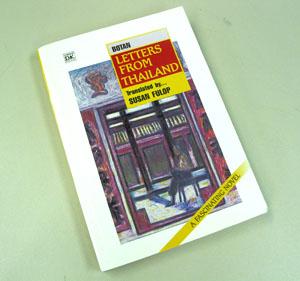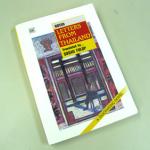A Man of Principle
In an early volley of the foolish war called political correctness, George Orwell once complained that a writer cannot mention Jews in print, favorably or otherwise, without eliciting a storm of outrage. So it is with a certain trepidation that I suggest that in some ways the Chinese could be called the Jews of Asia. (You see how cravenly I bury this assertion in qualifications.)
At least the stereotypes attached to the two groups are similar. The Chinese scattered throughout Asia are the backbone of the commercial class, and indeed the recent Asian "economic miracle" is largely their doing. They are seen as sober, diligent, and frugal sometimes to a fault; and they insist on remaining Chinese to the fullest possible extent. Chinatowns are not exactly ghettoes, but whenever an Asian nation becomes unstable, the rich and envied Chinese are often one of the first targets of violence, as they were in Indonesia when the dictator Suharto was deposed.
At certain times in its history, Bangkok has been up to 50% Chinese. The Thais call them kon jeen ("person China") but they reserve the word jek for the stereotypical miser. And about the jeks there are any number of defamatory jokes. For example: "It is foolish to make offerings at the temple like a Thai, when you could make offerings like the Chinese and then eat the food at the next meal."
The above joke is taken from Botan's Letters from Thailand, a novel consisting of letters from a Chinese immigrant in Bangkok to his long-suffering mother in China. Spanning the years 1945 to 1967, the letters constitute a scathing indictment, and finally a generous acquittal of the Thai way of life. That they are available in Thailand at all is a testament to the country's tradition of tolerance and freedom of expression - two traits for which China is not especially known. And it seems to me that they are also, as translator Susan Fulop writes in her introduction to the work, "the best and most entertaining picture of life in urban Thailand in mid-twentieth century that exists." Though critical of Thai people, the novel won the SEATO prize for Thai literature almost immediately after its publication in 1969.
In an article in the August 2002 issue of Harper's, novelist Martin Amis derided critics who pan a work of fiction merely because they did not like its characters. While I can understand that this constrains literary innovation, I fail to understand why anyone would endure an invented scoundrel when there are so many scoundrels to endure in life.
The Chinese immigrant Suang U is highly admirable and in some ways worthy of emulation. In an age where morality is "morality" and literature's finest models are spendthrifts, lechers, and drunks, it is refreshing to encounter a protagonist with principles. Not since reading the autobiography of Benjamin Franklin, that paragon of Puritanism and the Enlightenment, have I encountered such a manifesto on the virtues of self-discipline and thrift. If China becomes the economic behemoth that it is predicted to become, Letters from Thailand should be consulted for a cultural explanation.
The novel is a conventional rags-to-riches story. But it is also a novel of decline - of family, of tradition. Suang U has four children, of whom only one is a male. And the male, Weng Kim, proves a disaster at first. Reluctant to carry on his father's dull traffic in cookies, the boy takes to drink and dissolution. He dallies with a Thai prostitute named Pahni, whose "fearful candor" includes the unseemly fact that Kim has contracted the "women's disease," whatever that is. For her, "sex and rice are enough."
But Kim reforms, marries, applies nose to grindstone. One daughter marries Chinese, and into money and respect. Another gets pregnant, marries, suffers. Meng Ju, the youngest and spunkiest daughter, falls in love with a penniless Thai schoolteacher named Winyu. Meanwhile Suang U's wealth accumulates until he becomes a leader of his community, an occasional philanthropist, and a boon to his struggling children.
Until the book's very end, Suang U is fiercely critical of the Thai people; indeed Meng Ju calls him a bigot. From his point of view, the Thais do nothing but drink, gamble, and consort with women "as alike as glasses of beer." They are the first to adopt foreign fads and fashions - "as if one could dress up a chicken and convince the world that it was a peacock!" - yet they produce nothing on their own. He has reason to be upset. One of his Thai employees tries to operate his wife while under the influence; Pahni drugs the whole family and runs off with part of the family fortune; and the Thai merchants are as unhelpful as the government officers are feckless and corrupt. All of this is depressingly familiar.
But it is somewhat beside the point. There are, or were, reasons to be alive other than to become rich or more efficient. Saul Bellow best protested the new commercial age in one of Herzog's schizophrenic letters: "Dear Mr. President, Internal Revenue regulations will turn us into a nation of bookkeepers. The life of every citizen is becoming a business. This, it seems to me, is one of the worst interpretations of human life history has ever seen."
It is Winyu who subverts Suang U's dreary worldview, as well as his prejudice against Thais. For though the schoolteacher is just as ambitious and committed as his father-in-law is, he works toward the betterment of society rather than for the enrichment of himself or his family. "The ideal man in today's world," says Winyu, "would have the moral principles of the [Westerner], the diligence of the Chinese, and the heart of the Thai." Suang U is also changed by the realization that Weng Kim has become a chip off the old block - "astute, but ruthless, shallow, greedy, and selfish." Reflecting on his grunts and sweats under a weary life, he concludes that "two baht worth of rice with love at the supper table is a feast."
But Suang U's Luddism and fuddy-duddiness are not all bad. His family persuades him to buy an automobile so that they can drive to the cinema; then they persuade him to buy a TV so that they don't have to drive to the cinema. Such, all too often, is progress. Out of habit, Tan reckons luxuries in terms of how much food they could buy, and though he drinks alcohol only twice in two decades, he decides that a pack of cigarettes per week is an admissible vice. He loathes advertising, and thinks that the benefits of toothpaste are cancelled out by the availability of junk food. He learns to write with a ballpoint pen, but he returns to a brush because it produces a more beautiful line. And you can have your fork and spoon, you whippersnappers: I'll keep to my chopsticks, thanks.
Suang U's moral code includes elements that are recognizably Chinese, not least in his low estimation of women, and perhaps most in his adherence to the Confucian worship of ancestors. His letters to his mother are fawning, and like a latter-day Lear he is dismayed that his children do not heed him, much less revere him. When his wife is killed in a car crash - another depressingly familiar aspect of life in Thailand - Suang U haunts one after another of his children's homes, where he is unwanted and out-of-date. His mother never returns his letters, and it is suggested that the censors of the newly installed Communist government may have confiscated them (and the money included with them).
It would be impossible to include here all the uncommon wisdom contained in this deceptively common book. When I showed my bare and yellowed copy to an Irish acquaintance, she said in her lovely brogue, "It looks like it's been through the wars" - or the wash, I'm not sure. But as a three-year veteran of Thailand and a longer veteran of life, I can say that the copy is now additionally marred by scores of approving check marks.
Letters can be the most candid and heartfelt form of communication, and for that reason it is a pity that practically no one that I know can be bothered to write them anymore. You can have your prolix emails and your garbled cell-phone conversations. I prefer Suang U when he writes with all the omniscience of the Buddha: "I do not know why we are on this earth, but I do know that too many of us spend our few years upon it full of anxiety because we want more than is good for us."
* * * * *
Review of Botan's Letters from Thailand, Editions Duang Kamol, 1991.
* * * * *
 ThingsAsian
ThingsAsian

















